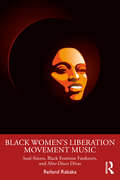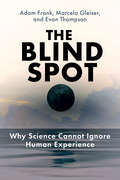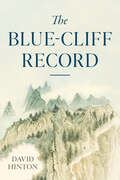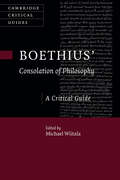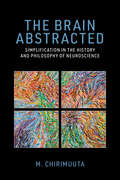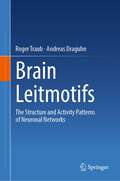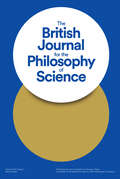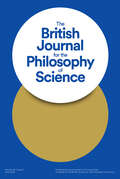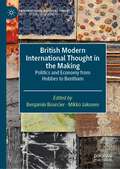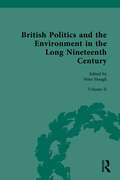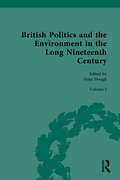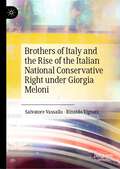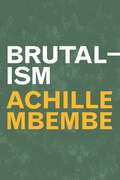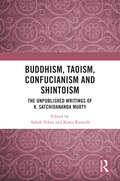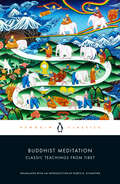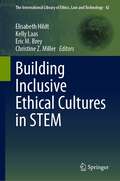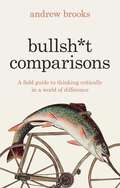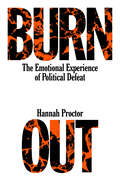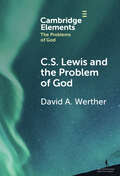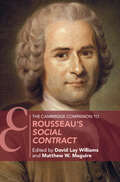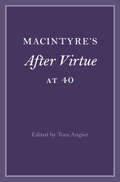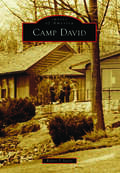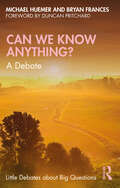- Table View
- List View
Black Women's Liberation Movement Music: Soul Sisters, Black Feminist Funksters, and Afro-Disco Divas
by Reiland RabakaBlack Women’s Liberation Movement Music argues that the Black Women’s Liberation Movement of the mid-to-late 1960s and 1970s was a unique combination of Black political feminism, Black literary feminism, and Black musical feminism, among other forms of Black feminism. This book critically explores the ways the soundtracks of the Black Women’s Liberation Movement often overlapped with those of other 1960s and 1970s social, political, and cultural movements, such as the Black Power Movement, Women’s Liberation Movement, and Sexual Revolution. The soul, funk, and disco music of the Black Women’s Liberation Movement era is simultaneously interpreted as universalist, feminist (in a general sense), and Black female-focused. This music’s incredible ability to be interpreted in so many different ways speaks to the importance and power of Black women’s music and the fact that it has multiple meanings for a multitude of people. Within the worlds of both Black Popular Movement Studies and Black Popular Music Studies there has been a long-standing tendency to almost exclusively associate Black women’s music of the mid-to-late 1960s and 1970s with the Black male-dominated Black Power Movement or the White female-dominated Women’s Liberation Movement. However, this book reveals that much of the soul, funk, and disco performed by Black women was most often the very popular music of a very unpopular and unsung movement: The Black Women’s Liberation Movement. Black Women’s Liberation Movement Music is an invaluable resource for students, teachers, and researchers of Popular Music Studies, American Studies, African American Studies, Critical Race Studies, Gender Studies, and Sexuality Studies.
The Blind Spot: Why Science Cannot Ignore Human Experience
by Adam Frank Marcelo Gleiser Evan ThompsonA compelling argument for including the human perspective within science, and for how human experience makes science possible.&“This is by far the best book I've read this year.&” —Michael Pollan, Professor of the Practice of Non-fiction, Harvard University; #1 New York Times bestselling author&“(A) stimulating manifesto for changing the way we look at things.&” —Wall Street JournalIt&’s tempting to think that science gives us a God&’s-eye view of reality. But we neglect the place of human experience at our peril. In The Blind Spot, astrophysicist Adam Frank, theoretical physicist Marcelo Gleiser, and philosopher Evan Thompson call for a revolutionary scientific worldview, where science includes—rather than ignores or tries not to see—humanity&’s lived experience as an inescapable part of our search for objective truth. The authors present science not as discovering an absolute reality but rather as a highly refined, constantly evolving form of human experience. They urge practitioners to reframe how science works for the sake of our future in the face of the planetary climate crisis and increasing science denialism.Since the dawn of the Enlightenment, humanity has looked to science to tell us who we are, where we come from, and where we&’re going, but we&’ve gotten stuck thinking we can know the universe from outside our position in it. When we try to understand reality only through external physical things imagined from this outside position, we lose sight of the necessity of experience. This is the Blind Spot, which the authors show lies behind our scientific conundrums about time and the origin of the universe, quantum physics, life, AI and the mind, consciousness, and Earth as a planetary system. The authors propose an alternative vision: scientific knowledge is a self-correcting narrative made from the world and our experience of it evolving together. To finally &“see&” the Blind Spot is to awaken from a delusion of absolute knowledge and to see how reality and experience intertwine.The Blind Spot goes where no science book goes, urging us to create a new scientific culture that views ourselves both as an expression of nature and as a source of nature&’s self-understanding, so that humanity can flourish in the new millennium.
The Blue-Cliff Record
by David HintonA once-in-a-generation translation of the definitive Ch&’an (Zen) koan collection from preeminent translator David Hinton.The Blue-Cliff Record, a collection of Ch&’an (Zen) koans stemming from the eleventh century, is a remarkable masterwork of classical Chinese literature, a philosophical text of profound power, and an active practice guide in use by Ch&’an and Zen Buddhists all over the world. Rendered with his trademark lyricism and philosophical rigor, this new edition from renowned translator David Hinton presents a whole new Blue-Cliff Record. Full of poetry, storytelling, and characters both zany and profound, Hinton&’s translation unveils the earthy insights of Ch&’an&’s original wisdom.Though it carries a reputation for impenetrable paradox, The Blue-Cliff Record was not meant to be a teaching tool understood only through long instruction from Zen masters. Rather, it is a finely crafted text intended to create a direct and immediate experience of awakening, a text that insists on the need to trust oneself rather than teachers for insight. Embracing this, Hinton&’s translation presents only the original koans and poems, free of the commentaries that usually shroud it. In doing so, he rekindles the provocative and illuminating fire of these one hundred classic koans.
Boethius’ ‘Consolation of Philosophy’: A Critical Guide (Cambridge Critical Guides)
by Michael WiitalaBoethius' Consolation of Philosophy was one of the most widely read and influential texts in medieval Europe, considering questions such as How can evil exist in a world governed by God? And how is happiness still attainable despite the vicissitudes of fortune? Written as a dialogue between Boethius and Lady Philosophy, and alternating between poetry and prose, the Consolation is of interest not only to philosophers but to students of classics and literature as well. In this Critical Guide, the first collection of philosophical essays devoted exclusively to the Consolation, thirteen new essays demonstrate its ongoing vitality and break open its riches for a new generation of readers. The essays reflect the diverse array of approaches in contemporary scholarship and attend to both the literary features and the philosophical content of the Consolation. The volume will be invaluable for scholars of medieval philosophy, medieval literature, and the history of ideas.
The Brain Abstracted: Simplification in the History and Philosophy of Neuroscience
by M. ChirimuutaAn exciting, new framework for interpreting the philosophical significance of neuroscience.All science needs to simplify, but when the object of research is something as complicated as the brain, this challenge can stretch the limits of scientific possibility. In fact, in The Brain Abstracted, an avowedly &“opinionated&” history of neuroscience, M. Chirimuuta argues that, due to the brain&’s complexity, neuroscientific theories have only captured partial truths—and &“neurophilosophy&” is unlikely to be achieved. Looking at the theory and practice of neuroscience, both past and present, Chirimuuta shows how the science has been shaped by the problem of brain complexity and the need, in science, to make things as simple as possible. From this history, Chirimuuta draws lessons for debates in philosophy of science over the limits and definition of science and in philosophy of mind over explanations of consciousness and the mind-body problem.The Brain Abstracted is the product of a historical rupture that has become visible in the twenty-first century, between the &“classical&” scientific approach, which seeks simple, intelligible principles underlying the manifest complexity of nature, and a data-driven engineering approach, which dispenses with the search for elegant, explanatory laws and models. In the space created by this rupture, Chirimuuta finds grounds for theoretical and practical humility. Her aim in The Brain Abstracted is not to reform neuroscience, or offer advice to neuroscientists, but rather to interpret their work—and to suggest a new framework for interpreting the philosophical significance of neuroscience.
Brain Leitmotifs: The Structure and Activity Patterns of Neuronal Networks
by Roger Traub Andreas DraguhnThis book tackles the question of why the brain is so difficult to fully understand. In neuroscience, data are acquired and analyzed with astonishing techniques and accumulate rapidly. Nevertheless, try to explain how a person can think or why there is such a condition as schizophrenia, and it appears that we really know little. To approach these difficulties, the authors first present a number of case studies in which the operation of a neural circuit is worked out in some detail and, at the same time, the functional significance of the operation is also understood. These examples are complicated in their biologic specifics but are conceptually straightforward. The examples are hoped to provoke an appreciation for what neuroscience can accomplish. The authors then develop some thoughts on how these issues can be addressed----instead of considering cognition in general, taking instead a subset of cognition that does lend itself to formal description.
Britain and the Dhofar War in Oman, 1963–1976: A Covert War in Arabia (Security, Conflict and Cooperation in the Contemporary World)
by Geraint HughesThis book explores Britain’s involvement in the Dhofar War of 1963-1976, focusing on the military aspects of this conflict in Southern Oman. It reveals how both the Conservative and Labour governments in office during this time provided military and security assistance to Oman’s rulers without parliamentary or press scrutiny. Based on archival material and witness accounts, as well as existing secondary source literature and memoirs, this study provides new insights into Britain’s clandestine embroilment in the Dhofar War, an often overlooked but historically significant intervention in the Middle East. This book will be a valuable resource for scholars and students interested in the complex and often controversial history of Britain’s involvement in Middle Eastern politics in the post-colonial period.
The British Journal for the Philosophy of Science, volume 75 number 1 (March 2024)
by The British Journal for the Philosophy of ScienceThis is volume 75 issue 1 of The British Journal for the Philosophy of Science. Since 1950, The British Journal for the Philosophy of Science (BJPS) has presented the best new work in the discipline. An international leader in the philosophy of science, BJPS showcases outstanding research on a variety of topics, from the nature of models and simulations to mathematical explanation and foundational issues in the physical, life, and social sciences. Published on behalf of the British Society for the Philosophy of Science, the journal offers innovative and thought-provoking papers that open up new areas of inquiry or shed new light on well-known issues.
The British Journal for the Philosophy of Science, volume 75 number 2 (June 2024)
by The British Journal for the Philosophy of ScienceThis is volume 75 issue 2 of The British Journal for the Philosophy of Science. Since 1950, The British Journal for the Philosophy of Science (BJPS) has presented the best new work in the discipline. An international leader in the philosophy of science, BJPS showcases outstanding research on a variety of topics, from the nature of models and simulations to mathematical explanation and foundational issues in the physical, life, and social sciences. Published on behalf of the British Society for the Philosophy of Science, the journal offers innovative and thought-provoking papers that open up new areas of inquiry or shed new light on well-known issues.
British Modern International Thought in the Making: Politics and Economy from Hobbes to Bentham (International Political Theory)
by Benjamin Bourcier Mikko JakonenThis book articulates international political theory in dialogue with economics on several questions. It asks: how has modern international theory been adjusted and nourished by economic ideas, theories and practices? How far has the distinctive contribution of some theorists to international theory been informed by their views on economy? What has been the impact of the theory of the state for economic and international theory? What sort of economic thinking has led to revise the debates constitutive for the modern international realm? How have economic debates been rhetorically connected to political debates in the field of international relations?
British Politics and the Environment in the Long Nineteenth Century: Volume II - Regulating Nature and Conquering Nature
by Peter HoughThis collection of archival source material chronicles British environmental politics between 1789 and 1914. This text examines the ways in which environmental issues were managed artistically and socially, as well as politically. Accompanied by extensive editorial commentary, this collection will be of great interest to students of environmental and political history.
British Politics and the Environment in the Long Nineteenth Century: Volume I - Discovering Nature and Romanticizing Nature
by Peter HoughThis volume of archival source material chronicles British environmental politics between 1789 and 1914. This text examines scientific discoveries during this period and the result of these findings on the political environment, bringing the publics attention to public health issues such as acid rain and river pollution. Accompanied by extensive editorial commentary, this collection will be of great interest to students of environmental and political history.
Brothers of Italy and the Rise of the Italian National Conservative Right under Giorgia Meloni
by Salvatore Vassallo Rinaldo VignatiThis book is an in-depth study of Fratelli d’Italia, the party led by Italian Prime Minister Giorgia Meloni. After providing a concise history of the neo-fascist and post-fascist parties to which Fratelli d’Italia is heir, the book examines its founding, statutory rules and internal organisation. The authors explore Meloni’s communication style and the national conservative ideology she has embraced, Fratelli d’Italia’s international network of alliances and its place in EU politics, and the composition of the electorate that led to the success of her and the party in the 2022 parliamentary elections. Through well-documented, rigorous and impartial analysis, the book offers insights into the path Fratelli d’Italia has taken and the identity it has built in its first ten years – explaining why a political tradition that seemed destined for extinction has come to power and is now attempting to change coalition politics in the EU. In doing so, the authors challenge several entrenched assumptions about populist and radical right-wing parties. The Italian edition of the book was reviewed in national newspapers and other media, garnering praise from a wide range of political perspectives.
Brutalism (Theory in Forms)
by Achille MbembeIn Brutalism, eminent social and critical theorist Achille Mbembe invokes the architectural aesthetic of brutalism to describe our moment, caught up in the pathos of demolition and production on a planetary scale. Just as brutalist architecture creates an affect of overwhelming weight and destruction, Mbembe contends that contemporary capitalism crushes and dominates all spheres of existence. In our digital, technologically focused era, capitalism has produced a becoming-artificial of humanity and the becoming-human of machines. This blurring of the natural and artificial presents a planetary existential threat in which contemporary society’s goal is to precipitate the mutation of the human species into a condition that is at once plastic and synthetic. Mbembe argues that Afro-diasporic thought presents the only solution for breaking the totalizing logic of contemporary capitalism: repairing that which is broken, developing a new planetary consciousness, and reforming a community of humans in solidarity with all living things.
Buddhism, Taoism, Confucianism and Shintoism: The Unpublished Writings of K. Satchidananda Murty
by Ashok Vohra and Kotta RameshK. Satchidananda Murty (1924-2011) was a vociferous writer and an iconoclast. This volume is a collection of his unpublished writings in philosophy. It features Murty's essays on Buddhism, Taoism, Confucianism and Shintoism. The texts study the origins of Indian, Chinese, and Japanese philosophical traditions and provide a comparative study of the different schools of thought. Murty analyses the development of science in the ancient Indian tradition, especially in the areas of geometry, algebra, architecture, engineering, and astronomy. He also provides recommendations for promoting Asian philosophies and cultures to the world, without dependence on the West. An important contribution, the book presents K. Satchidananda Murty's contribution to philosophy during sixty-one years of his engagement with active writing and teaching. It will be of great interest to scholars, teachers, and students of Indian philosophy, Hindu philosophy, comparative philosophy, Asian Philosophy, religious studies, and South Asian studies.
Buddhist Meditation: Classic Teachings from Tibet
by Kurtis R. SchaefferA Tibetan Buddhist anthology of accessible and authentic contemplative exercises to help cultivate innate yet undeveloped powers of mind, emotion, and body. A Penguin Classic Drawn from Tibet's rich contemplative literature, Buddhist Meditation offers classic exercises focused on the opportunities and challenges of life; cultivating inner calm; fostering a wider perspective on oneself in relationship to others; working with negative emotions, and the highest values of the Buddhist tradition, love and compassion. Several dozen meditation instructions are collected in twelve chapters. All major traditions of Tibetan Buddhism are represented. The book is structured on "foundation practices", practice manuals that immerse the reader in the search for meaningful and compassionate responses to the ubiquity of human suffering, and in the contemplative techniques that translate that search into consequential action. Spiritual exercises introduce 1) the opportunity for self-betterment and to be of benefit to other living beings; 2) the inescapable persistence of suffering in life, and the reality of death; 3) the workings of ethical cause and effect, otherwise known as karma; and 4) the ever-repeating succession of frustration known as cyclic existence, or samsara. The second set of foundation practices provide tools to build upon including: 5) taking refuge in Buddhism—a deep formal commitment to integrate Buddhist contemplative and ethical teachings into one's life; 6) cultivating love and compassion for all living beings; 7) clearing away cognitive, emotional, and behavioral impediments to actualizing love and compassion; 8) developing with wisdom and the experience and excellent qualities necessary to put love and compassion into practice; and 9) dedicating oneself to a spiritual mentor to serve as a guide through this intensive program of training. Part existential philosophy, part ethics, part self-help program, part cosmology—the foundation exercises present a complete Buddhist picture of life, the ethical universe, and the first steps in making a positive impact in life for ourselves and others, steps anyone can begin to take by dedicating themselves to train in contemplative exercises.
Building Inclusive Ethical Cultures in STEM (The International Library of Ethics, Law and Technology #42)
by Elisabeth Hildt Kelly Laas Eric M. Brey Christine Z. MillerThis book shares innovative approaches to effectively engage students and faculty working in research labs, lab-based classrooms and courses to build inclusive ethical cultures. The frameworks and approaches presented move beyond traditional research ethics training to strengthen the ethical culture in research labs. The chapters in the book showcase best practices and approaches to embedding educational interventions in courses, research labs and departments. The book is based on the two-day workshop “Building Inclusive Ethical Cultures in STEM” (April 23-24, 2021). Moving beyond the two-day conference that inspired this collected volume, the various chapters address questions like: What are approaches and tools to integrate ethics education in STEM effectively? How can STEM ethics education be improved? What can researchers do to build more inclusive research environments? How can meaningful discussions about ethics be effectively integrated into STEM courses, research labs, and workplace environments? While each chapter takes a different perspective and is located in its respective context, the contributions are united by the goal of effectively including ethical reflection in STEM education. Instructors from both four-year and two-year colleges who teach STEM and lab-based STEM courses; young principal investigators/junior faculty who are in the process of building their research groups; departmental chairs interested in programmatic approaches for improving mentoring, research ethics education, and the research culture of their department, will find this work to be a very valuable resource in their daily practice.
Bullshit Comparisons
by Andrew BrooksBullshit Comparisons will challenge the way you think about rankings, charts and other marketing and political tools designed to create odious and dangerous comparisons.Is Boris Johnson really like Winston Churchill? Are electric cars actually greener than petrol ones? Which is the world's most successful university? Is Lisbon the new Barcelona? Should we compare the achievements of younger and older siblings even when we know it damages their self-worth? We make comparisons every day, but how helpful are they? Looking across a dazzling range of situations both familiar and unfamiliar, Bullshit Comparisons is a ground-breaking examination of the role of comparison in modern society, illuminated by examples spanning from the FIFA World Footballer of the year, to wine-tasting in London, hospital care in Sierra Leone and avocado farming in Colombia. Challenging us to think critically about the use of comparison through accessible, personal, and often amusing research, Andrew Brooks reveals the uses and abuses of comparisons in a book that isn't like anything else you have read.
Burnout: The Emotional Experience of Political Defeat
by Hannah Proctor"Hannah Proctor takes that feeling we all have, and names it again and again, helping us to resee the past and present of revolutionary struggle. A must-read."–Hannah Zeavin, Founding Editor, Parapraxis How to maintain hope in the face of despairIn the struggle for a better world, setbacks are inevitable. Defeat can feel overwhelming at times, but it has to be endured. How then do the people on the front line keep going? To answer that question and to help readers roll with the punches, Hannah Proctor draws on historical resources to find out how revolutionaries and activists of the past kept a grip on hope.Burnout considers former Communards exiled to a penal colony in the South Pacific; a young Bolshevik fleeing the city in despair; an ex-militant on the analyst&’s couch relating dreams of ruined landscapes; a trade union organiser seeking advice from a spiritual healer; and a group of feminists padding a room with mattresses to scream about the patriarchy. Jettisoning therapy talk and its stranglehold on our language, Proctor offers a different way forward - neither denial nor despair. Her cogent exploration of the ways militants make sense of their own burnout demonstrates that it is possible to mourn and organise at once, and to do both without compromise.
C.S. Lewis and the Problem of God (Elements in the Problems of God)
by null David WertherUnderstanding C.S. Lewis's vocation is essential for reading his works well, as is knowing how he came to it: his long and winding philosophical journey and reoccurring experiences of 'Joy.' Lewis discounted 'proofs' in philosophical theology but offered key arguments in support of theism per se, and Christianity in particular. His account of “mere Christianity” shows the centrality of self-determination, an emphasis on Christ's human nature, and a relativizing of atonement theories. Finally, Lewis's understanding of faith, his attempts to make sense of petitionary and imprecatory prayers, and his emphasis on theosis/deification, are considered.
The Cambridge Companion to Rousseau's Social Contract (Cambridge Companions to Philosophy)
by David Lay Williams Matthew W. MaguireWhat is freedom? What is equality? And what is sovereignty? A foundational text of modern political philosophy, Rousseau's Social Contract has generated much debate and exerted extraordinary influence not only on political thought, but also modern political history, by way of the French Revolution and other political events, ideals, and practices. The Social Contract is regularly studied in undergraduate courses of philosophy, political thought, and modern intellectual history, as well as being the subject of graduate seminars in numerous disciplines. The book inspires an ongoing flow of scholarly articles and monographs. Few texts have offered more influential and important answers to research questions than Rousseau's Social Contract, and in this new Cambridge Companion, a multidisciplinary team of contributors provides new ways to navigate this masterpiece of political philosophy- and its animating questions.
Cambridge Philosophical Anniversaries: MacIntyre’s After Virtue at 40 (Cambridge Philosophical Anniversaries Ser.)
by Tom AngierCamp David (Images of America)
by Robert P. SavittOriginally named Shangri-La by Franklin D. Roosevelt, today's Camp David was a well-guarded secret until its existence was revealed after World War II. A US Naval facility set on a mountaintop, Camp David's tight security has piqued the curiosity of Americans and foreigners. Prior to the outbreak of war, Roosevelt had access to the nearby presidential yacht as a "getaway" to escape the pressures of life in the White House. After a brief search of nearby locations, a site on Catoctin Mountain in Maryland was chosen as the place for the presidential retreat. It remained Shangri La until President Eisenhower said the name was "just a little fancy for a Kansas farm boy" and renamed it Camp David after his father and grandson in 1953. It has served as retreat for each succeeding president and, in addition to providing rest and relaxation, has been the setting of several historic meetings. Robert P. Savitt writes and lectures on a variety of historical subjects. He holds a doctoral degree from Georgetown University, served in the Departments of Defense and State, and was legislative director for a US senator. Savitt has authored three previous Arcadia Publishing titles.
Can We Know Anything?: A Debate (Little Debates about Big Questions)
by Bryan Frances Michael HuemerIn this book, Michael Huemer and Bryan Frances debate whether – and how – we can gain knowledge of the world outside of our own minds. Starting with opening statements, the debate moves through two rounds of replies. Frances argues that we lack knowledge because, for example, we cannot rule out the possibility that we are brains in vats being artificially stimulated in such a way as to create an illusion of living in the real world. Huemer disagrees that we need evidence against such possibilities in order to gain knowledge of the external world, maintaining instead that we are entitled to presume that things are as they appear unless and until we acquire specific grounds for thinking otherwise. The authors go on to discuss how one should think about controversial issues wherein the experts persistently disagree. Frances argues that we should generally withhold judgment about such issues or at least greatly reduce our confidence. Huemer agrees that people are often overconfident about controversial issues but tries to carve out exceptions wherein one can rationally hold on to controversial views. Accessible whilst also detailed and substantial, this thoughtful debate is suitable for readers at all levels, from those encountering the topic for the first time through those who are deeply familiar with the issues. Key Features: Showcases arguments from two leading philosophers in standard form and in clear language Presents definitions in an easily accessible form Summary boxes recap key arguments Includes an annotated bibliography and glossary of all specialized vocabulary
Capital of Mind: The Idea of a Modern American University
by Adam NelsonThe second volume of an ambitious new economic history of American higher education. Capital of Mind is the second volume in a breathtakingly ambitious new economic history of American higher education. Picking up from the first volume, Exchange of Ideas, Adam R. Nelson looks at the early decades of the nineteenth century, explaining how the idea of the modern university arose from a set of institutional and ideological reforms designed to foster the mass production and mass consumption of knowledge. This “industrialization of ideas” mirrored the industrialization of the American economy and catered to the demands of a new industrial middle class for practical and professional education. From Harvard in the north to the University of Virginia in the south, new experiments with the idea of a university elicited intense debate about the role of scholarship in national development and international competition, and whether higher education should be supported by public funds, especially in periods of fiscal austerity. The history of capitalism and the history of the university, Nelson reveals, are intimately intertwined—which raises a host of important questions that remain salient today. How do we understand knowledge and education as commercial goods? Should they be public or private? Who should pay for them? And, fundamentally, what is the optimal system of higher education for a capitalist democracy?
